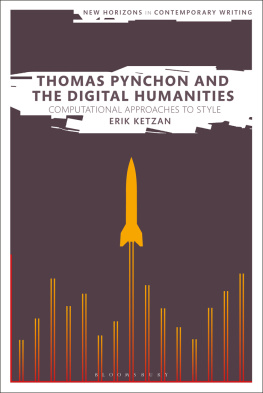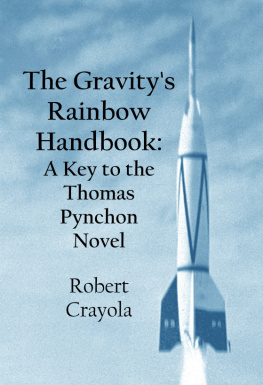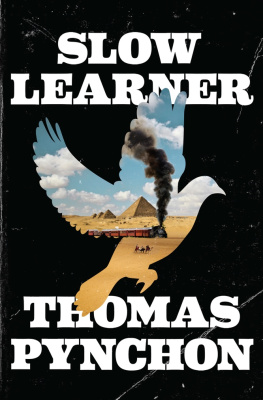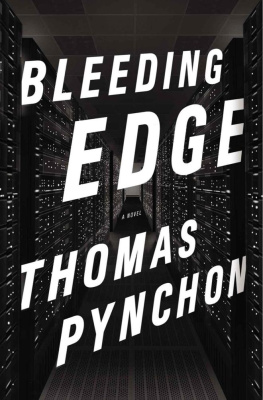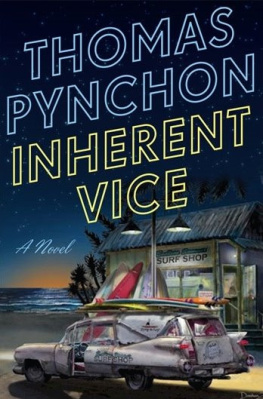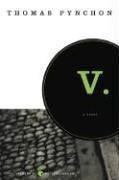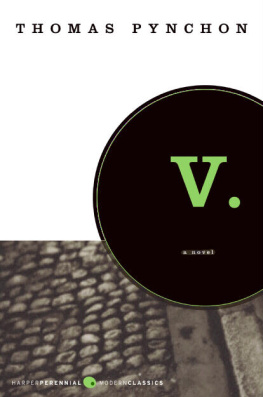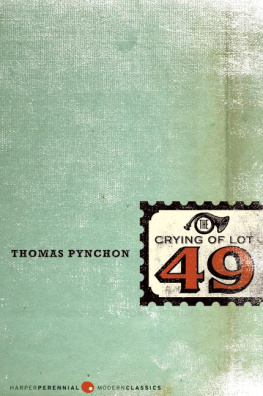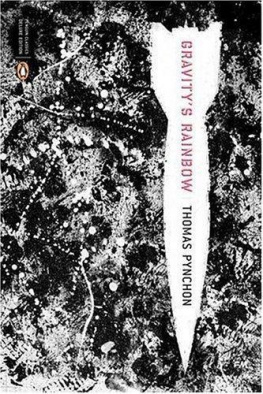Copyright Chris Eaton 2010
Published by ECW Press
2120 Queen Street East, Suite , Toronto, Ontario, Canada M4E 1E2
416-694-3348 / info@ecwpress.com
All rights reserved. No part of this publication may be reproduced, stored in a retrieval system, or transmitted in any form by any process electronic, mechanical, photocopying, recording, or otherwise without the prior written permission of the copyright owners and ECW Press. The scanning, uploading, and distribution of this book via the Internet or via any other means without the permission of the publisher is illegal and punishable by law. Please purchase only authorized electronic editions, and do not participate in or encourage electronic piracy of copyrighted materials. Your support of the authors rights is appreciated.
LIBRARY AND ARCHIVES CANADA CATALOGUING IN PUBLICATIONS
Eaton, Chris, 1971-
Letters to Thomas Pynchon and other stories [electronic resource] / Chris Eaton.
Short stories.
Electronic document in EBOOK format.
ISBN 978-1-55490-994-0
ALSO ISSUED AS: 978-1-55490-995-7 (PDF)
I. Title.
PS8559.A8457L48 2010 C813.6 C2010-906426-7
Developing editors: Emily Schultz and Brian Joseph Davis
Copyeditor: Emma Healey
Cover design: David Gee
Cover image: Oil Country by Julian Forrest ( 2009 )
Typesetting and text design: Troy Cunningham
The publication of Letters to Thomas Pynchon has been generously supported by the Government of Canada through the Canada Book Fund.

Letter to You
August , 2010
Dear [readers name] ,
Ive gone about my life all backwards. Instead of starting with short stories, as most young writers do, when I was fifteen I wrote my first novel. It was horrible, Im sure. But it didnt stop me from writing a second. And a third. There may even have been a fourth, scribbling twenty pages a day under the pool table in my parents basement, but they have all been destroyed, and my memory is heavily imaginative. Sometimes I even imagine they might have been worth keeping.
I have written short stories, on the other hand, very intermittently. And largely, other than the five stories in here that will likely appear in some form in a novel-in-progress called Chris Eaton: A Biography (Im sure you can guess which ones, all based loosely around the lives of other Chris Eatons Ive been stalking on the Internet), Ive written them because someone asked me to. One of the stories in this collection was written because a friend asked me to join a writing group, and I needed something to submit. And three of them were solicited for specific magazines, all of which met with disastrous ends before publication of my piece one bankruptcy, one lack of interest to continue the publication, and one asshole. In fact, the first short story I ever wrote, Mister Monsieur, was in my first year at university. I was probably twenty. Through a girlfriend at the time who thought I was a writer, I was asked to compose something for a weekend insert to the New York Times . It should have appeared in the third of these, but the Times changed its mind after the second, and without their financial support, the whole thing folded. I believe the structure of the story had a very specific meaning at some point, but I cant, for the life of me, recall it. I had also recently spent a year in Europe and mistakenly checked out of a hotel while keeping the key (the source of a huge argument with the woman at the front desk), and pieces of this small moment of my life have made their way into several things Ive written, including that argument in the novel Im working on now.
I guess I figured playing music was more fun than fiction, because in those four years at Mount Allison the only other thing I wrote besides songs was the first line of The Grammar Architect , which I wrote in the back of an English class on Modern Lit in my second or third year, initially composing a murder mystery of about five or six pages, and then editing it down to one sentence, and then building that back into a -page novel.
Then I moved to Toronto for an MA at York University (to which I dont recall applying and discovered I had been accepted just a few days before the commencement of classes, so I showed up late and took the only classes that werent yet full). There I met people like Stephen Cain, Steven Hayward, Christian Bk, and Darren Wershler-Henry, and that got me into writing again. It was Steven Hayward who invited me to his writing group, for which I think I produced Chasing Games. One of the courses I took with him was supposed to be on Canadian Modernist Poetry, but in order to get the supposed context, we spent three quarters of the class studying what was going on in Europe. Learning about the writing constraints of groups like OuLiPo made it possible for me to get back into fiction. The section titles of this story all came from a real book on chasing games by a woman named Edith Fowke. I found it at a garage sale. I had no idea, at this point, that Edith Fowke was a folklorist of some renown in Canada. And I didnt find out until recently that she died about a year after I wrote this, which I still find pretty creepy.
I believe it was Stephen Cain who asked me to write something for a magazine that never got off the ground, and in an afternoon in Stephens apartment, I wrote Monster. I think that was supposed to be the theme of the issue. Apparently, after re-reading several of the stories in here, one of my personal recurring themes is people who hate cats.
For several months during my MA at York University, I became obsessed with writing fake letters/e-mails. Mostly to people who didnt exist, or to celebrities I pretended to misunderstand. I wrote to Jennifer Love Hewitt about her Scream movies, for example, and to Pynchon as if he had written Catcher in the Rye . I wrote to Captain Crunch and Mr. Sub (about what, I cant remember). And I recall writing a complaint letter to Yoplait with pieces of hair taped to the page, which we can all be glad is not included here.
At one point, I found some university letterhead and even considered writing invitations to various celebrities to come to a presentation on rejection (part of a symposium where I first heard Christian and Darren read), which would just be me reading the form letters I got back from their staff. But in the end I must have chickened out, afraid someone would actually show up, or that I might offend my classmates. And yet, of all the letters and e-mails I wrote (aside from the complaint letters, which were highly profitable, probably more so than writing fiction), I only received two real responses. One was from Thomas Pynchon, or whoever had registered the e-mail thomas.pynchon@hotmail.com. I recall his response was simply Fuck you, whiner . By far the most exciting, however, was the letter to Levi Strauss. This letter was written shortly after the Supreme Court decision to ban cigarette advertising in Canada, and the reply in this book is the actual reply I received from Levis. The people I quote are mostly baseball players from the Cleveland Indians, which is a game I still tend to play, as evidenced by some of the China names in Hungry Generations.
Sometimes I feel bad about having wasted the time of the woman at Levis. Other times, I think she felt the joke was on me. But I guess thats what got me back into writing more steadily. Over the next year or two, I wrote The Inactivist , and Burke , a chapbook that would become a novel called Columba St. and eventually The Grammar Architect . I guess I must have written Serwold and the Artist in there too, which is maybe my first artist in pointless pursuit, something I keep revisiting in my fiction and my life. After the success of The Grammar Architect , which was billed as a cover of Thomas Hardys A Pair of Blue Eyes , I was approached by an editor at a fairly prominent Canadian magazine to try the cover experiment again. I was reluctant, but eventually was convinced and hit on the idea to turn James Joyces Dubliners into one short story, with short sections representing each of the original parts. In the end, it was a lot of fun, shifting the stories to my own city of Toronto while, I hope, capturing some elements of the themes and style in Joyces work. But by the time it was complete, the editor who had contracted me was gone, and the editor-in-chief changed the theme of the issue and decided not to use the story or pay me for it. He also didnt even tell me any of this until I contacted them.


